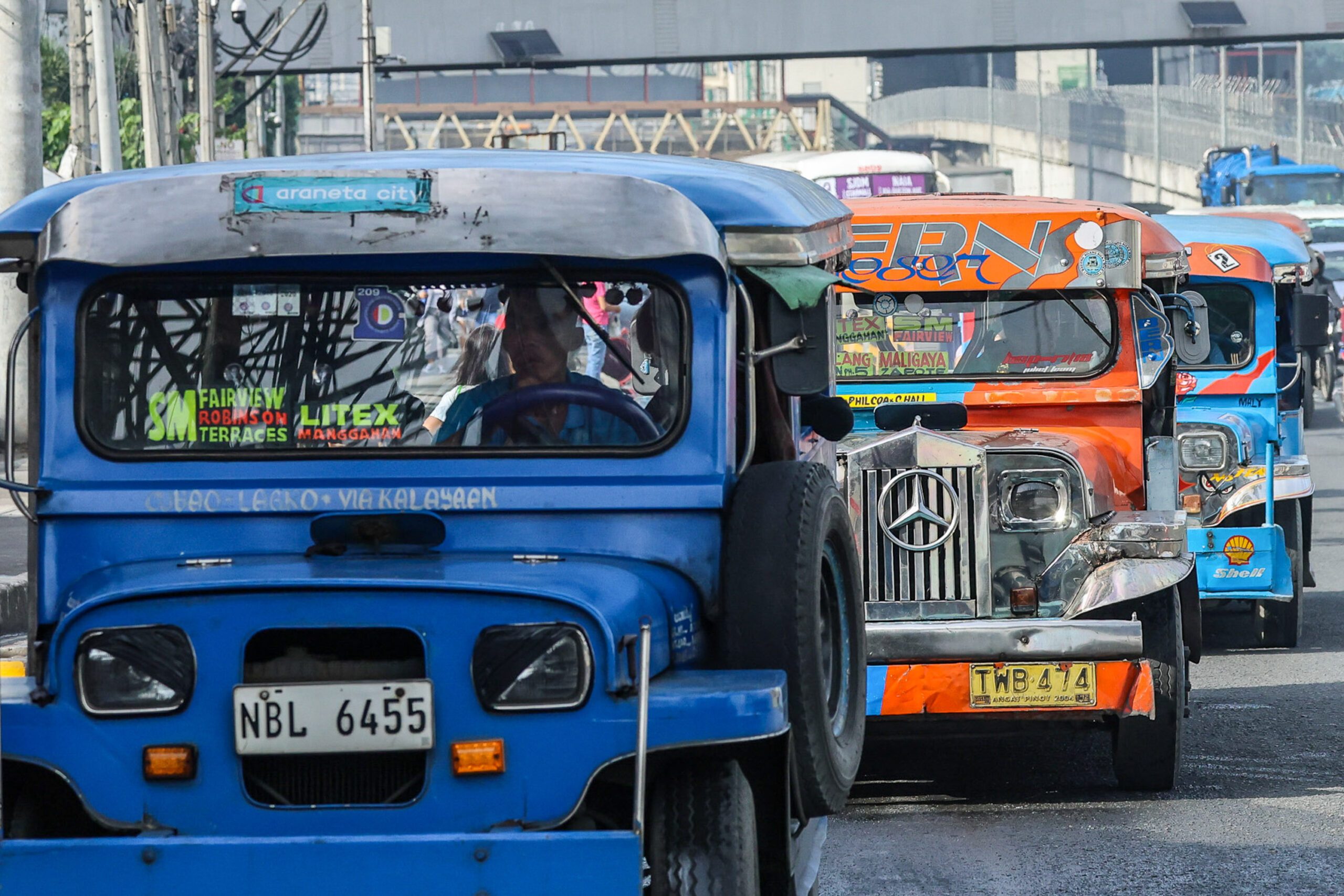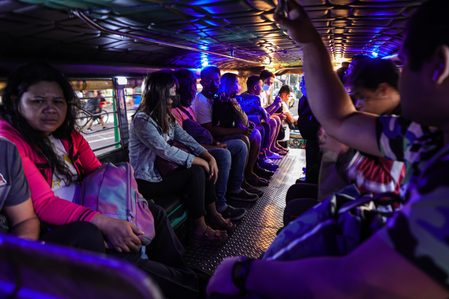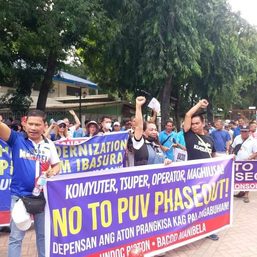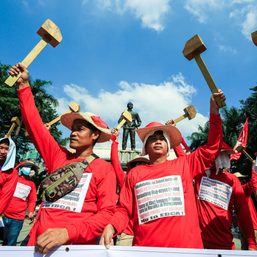SUMMARY
This is AI generated summarization, which may have errors. For context, always refer to the full article.

MANILA, Philippines – With another transport strike now happening in protest of the jeepney consolidation deadline set for Tuesday, April 30, some transport advocates warn that there’s a long way to go in realizing the modernization program.
There’s a growing possibility that in the rush to meet the deadline, jeepney drivers and operators consolidated into cooperatives in name only. These groups might not yet actually be ready for what consolidation entails.
“Nahirapan din po sila mismo sa pag-organize ng mga cooperatives nila. Kailangan nila ng masusing training sa fleet management, kailangan nila ng maayos na governance and financing – meaning maraming preparatory steps for a cooperative to really serve the commuting public,” Move as One Coalition advisor Kenneth Abante said.
(They’re having difficulty organizing their cooperative. They need proper training in fleet management, and they need good governance and financing – meaning there are many preparatory steps for a cooperative to really serve the commuting public.)
Rappler also spoke with National Confederation of Transport Unions (NCTU) secretary general Jaime Aguilar about the modernization program. He agrees that consolidation is an important step forward, but thinks that the government is “forcing” transport workers to consolidate too quickly.
“‘Yan ang hindi maganda sa nangyari dito sa PUV [Modernization Program]. Dapat pagandahin ‘yung programa para hindi ito sapilitan (That’s what isn’t good about what happened here with the PUV Modernization Program. They should have made the program better so that no one has to be forced),” Aguilar told Rappler.
He said many of the cooperatives who were forced to consolidate still need capacity building. As part of the transition, he expects that they need “at least two years” to practice fleet management, which involves coordination among members of the cooperative to deploy jeepneys where passengers need them most.
He also said jeepney drivers and operators need time to embrace the idea of a cooperative from a cultural viewpoint.
For example, before consolidation, a jeepney driver only had to meet their “boundary” for the day, but could otherwise choose to rest when they wanted to. But under a more formal setup like a cooperative, a jeepney driver would have to adjust to more defined routes along with the concept of fleet management.
“Mula sa informal labor siya, napunta na siya sa formal labor. Mas gusto nila ‘yung sarili nilang control (From informal labor, they now go into formal labor. They would rather still have control),” Aguilar told Rappler.
Angie Mata, another NCTU leader in Cebu, also highlighted how some jeepney operators and drivers are skeptical of forming cooperatives after decades of making a livelihood as individual jeepney drivers and operators.
“Imagine from an individual transport operator, i-group mo sila. Hindi naman sila gano’n ka-bonding,” Mata said. “May friends sila pero given ‘yung trust and confidence mo sa isang group mo, which is an economic activity na po…it’s been a struggle.“
(Imagine from being individual transport operators, they’re now grouped together. They haven’t even bonded with each other that well. They do have friends, but given the trust and confidence that you need to have in forming a group…it’s been a struggle.)
Lack of route plans
Transport advocates also criticized the government for sticking to its April 30 consolidation deadline even though it hasn’t completed its own project deliverables.
“We see that the consolidation deadline this April 30 is really senseless because in order for the modernization program to really improve commuter service quality, there’s a lot more preparation that you need to do,” Abante told reporters in a mix of English and Filipino.
For instance, Abante said, the government still lacks rationalized route plans for many areas around the country. These plans are supposed to include details about route networks, modes, and the required number of units per mode needed for each area. Back in March 2023, senators pointed out that only 8.8% of route plans have been approved, or just 139 route plans out of an expected 1,575 across local government units (LGUs) nationwide.
The government is struggling to produce all these route plans, partly because of the limited budget being allocated for the massive program. The Department of Transportation already previously admitted that it lacks the budget to even pay manpower to actually implement the program on the ground.
“The scope of implementation is everywhere all at once, with very little budget and staff,” Abante said.
Given budget constraints, the transportation advocate suggests starting the implementation along priority routes with “focused monitoring of actual service standards.”
Ideally, these routes would already have good local public transport route plans, along with a single consolidated franchise holder and an LGU that’s ready to help.
‘Urgent review’
Aside from transport advocates, several of the country’s biggest worker and employer groups also called for an “urgent review” of the Public Utility Vehicle Modernization Program (PUVMP).
“We call for an urgent review of the PUVMP in order to address its legal, financial, and human rights infirmities; a suspension of the deadline for consolidation for an indefinite period of time; and, advocate for the creation of an affordable, sustainable, and carbon-neutral mass transport system,” said a joint statement by the Leaders Forum.
The joint statement was signed by the Employers Confederation of the Philippines, Philippine Chamber of Commerce and Industry, and Philippine Exporters Confederation, as well as trade groups Federation of Free Workers, Sentro ng mga Nagkakaisa at Progresibong Manggagawa, and Trade Union Congress of the Philippines.
Meanwhile, the government said it will stand firm with its April 30 deadline, which it views as the first step to rolling out and improving its program.
“For me, after April 30, there should not be a scenario para tayo mag-aaway, magkakagulo – tapos na po tayo doon (where we’ll be fighting – we’re done with that). Consolidation will end April 30,” Road Transport and Infrastructure Undersecretary Jesus Ferdinand “Andy” Ortega said during a press conference held with the transport advocates.
Ortega also said that although the government has no plans to do a phased implementation of the modernization program or to focus on priority routes, it will “be sensitive on concerns about areas that may experience problems.” – Rappler.com
Add a comment
How does this make you feel?




![[OPINION] Gov’t, jeepneys, and blindly following the logic of modernity](https://www.rappler.com/tachyon/2024/05/tl-jeepneys-logic-of-modernity.jpg?resize=257%2C257&crop_strategy=attention)


There are no comments yet. Add your comment to start the conversation.